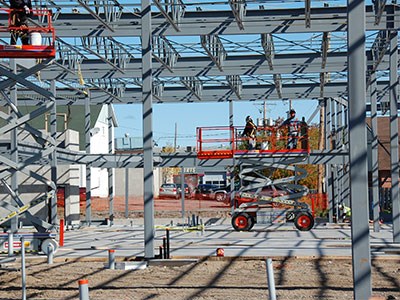Ontario's construction sector is waiting on a provincial private member’s bill to create a level playing field when it comes to subcontractors and tradespeople getting paid on time.
While most employers pay their workers on a regular basis, things aren’t as clear in Ontario's construction industry where subcontractors can go months without receiving a dime.
“Construction is unique in a few areas that you couldn't get away with in any other industry,” said Jeff Koller, compliance officer for the Ontario Construction Finishing Industries Alliance. “It's a competitive market and the issue of delinquent payment has gone on for decades.”
A 2013 report prepared by Prism Economics and Analysis calls the practice of late payment “widespread” in the province’s construction sector.
Liberal MPP Steven Del Duca’s Bill 69 could be the remedy if it wasn’t stalled at the provincial committee level.
Known as the Prompt Payment Act, it would require developers and prime contractors to pay their bills to lower end sub-contractors and tradespeople within a reasonable time frame, likely 30 days.
The language hasn’t been drawn up but there are many industry voices that say this practice won't fix itself without legislation.
Del Duca, the MPP for Vaughan and formerly with the Carpenter’s District Council of Ontario, has all-party support at Queen’s Park for Bill 69, but his bill has been mysteriously hung up at the provincial standing committee on regulations and private bills since May.
The current legislative session is on winter holiday hiatus and comment from Del Duca’s office was not available.
Should the bill ever pass, it would be the first legislation of its kind in Canada.
Most U.S. states have enacted such legislation on publicly-funded projects and 31 have laws for private projects. The United Kingdom, the European Union, Australia and New Zealand have similar measures in place.
Among those endorsing Bill 69 are the Ontario General Contractors Association, the Provincial Building and Construction Trades Council, and the Ontario Construction Secretariat.
On large projects, the vertical supply chain and the trickle-down flow of cash almost lends itself to late payment problems.
The Prism report said most owners, developers and top-level contractors abide by their contractual payment schedules, but some delay payments – possibly to finance their next project – which has a cascading effect on workers and material suppliers further below.
Those higher up will claim work was deficient or that money from a developer was not received.
Off-loading the risk of late payment to those down below is known in industry contract vernacular as “pay-when-paid” and “pay-if-paid.”
“The ones at the apex of the pyramid control all the money and they flow it out as they see fit,” said Koller, who knows of one residential drywaller with accounts receivable of $7.6 million, $6 million of which was more than 120 days past due.
Late payment woes can force some cash-strapped companies to settle for less than what was contractually agreed upon.
“The practice of delinquent payment has been going on for so long that contractors, in order to meet payroll, often have to make deals and accept 70 cents on the dollar or less in order to get paid anything,” said Koller.
Ontario's lien system only addresses those who default on payments, not the slow payers.
The Construction Lien Act allows contractors to file within 45 days of substantial completion of a project which can hurt trades like drywallers and painters, usually the last ones to leave a construction site.
“Often times the act rights will expire before they even realize they’re not going to get paid,” said Koller.
The fallout in the industry means companies refrain from hiring or don’t take on apprentices, and postpone buying machinery and equipment. It can drive up the cost of construction in Ontario and some project managers have resorted to hiring so-called “independent contractors” instead of hourly workers.
Koller said there’s no guarantee Bill 69 will ever become law given the government's minority position.
Many in the industry thought it was a done deal after attending a $5,000-a-plate fundraiser late fall where Premier Kathleen Wynne endorsed the legislation.
“Wynne has gone on record saying she'll do what she can to get it passed,” said Koller. “So what's the hold up? It's baffling.”
Equally mystified is Denis Shank, executive director of the Sudbury Construction Association, a staunch supporter of Bill 69.
Some of his members were burned last summer by one of Canada’s largest contracting firms.
The Comstock Group of Burlington entered bankruptcy protection last July owing almost $3.5 million to unsecured creditor companies and tradespeople in Sudbury, Thunder Bay, Timmins and elsewhere.
Comstock worked on large-scale industrial, commercial, institutional and energy projects across Canada including at Vale's Clarabelle mill in Sudbury and its Clean AER project at its Copper Cliff smelter.
“Some are hurting from it and some might not make it,” said Shank. “It affects everything from hiring subtrades, expanding your business and bringing in apprentices… and you can’t plan accordingly when you’re playing in the fine margins of profit.”
If the bill doesn’t pass during this legislative session, Shank is confident it will resurface again with a new government. “The industry is not going to support a government that doesn’t want to support them.”




